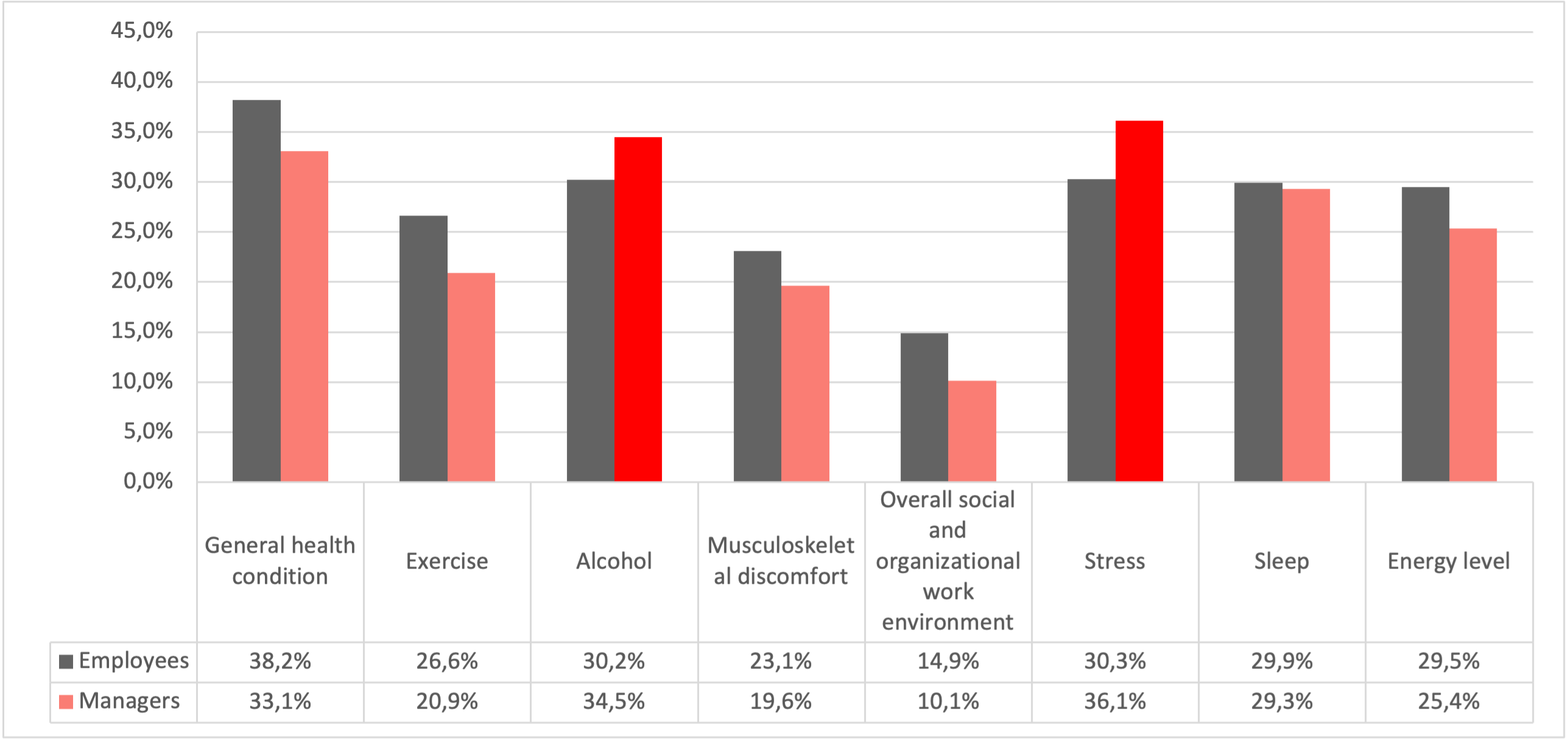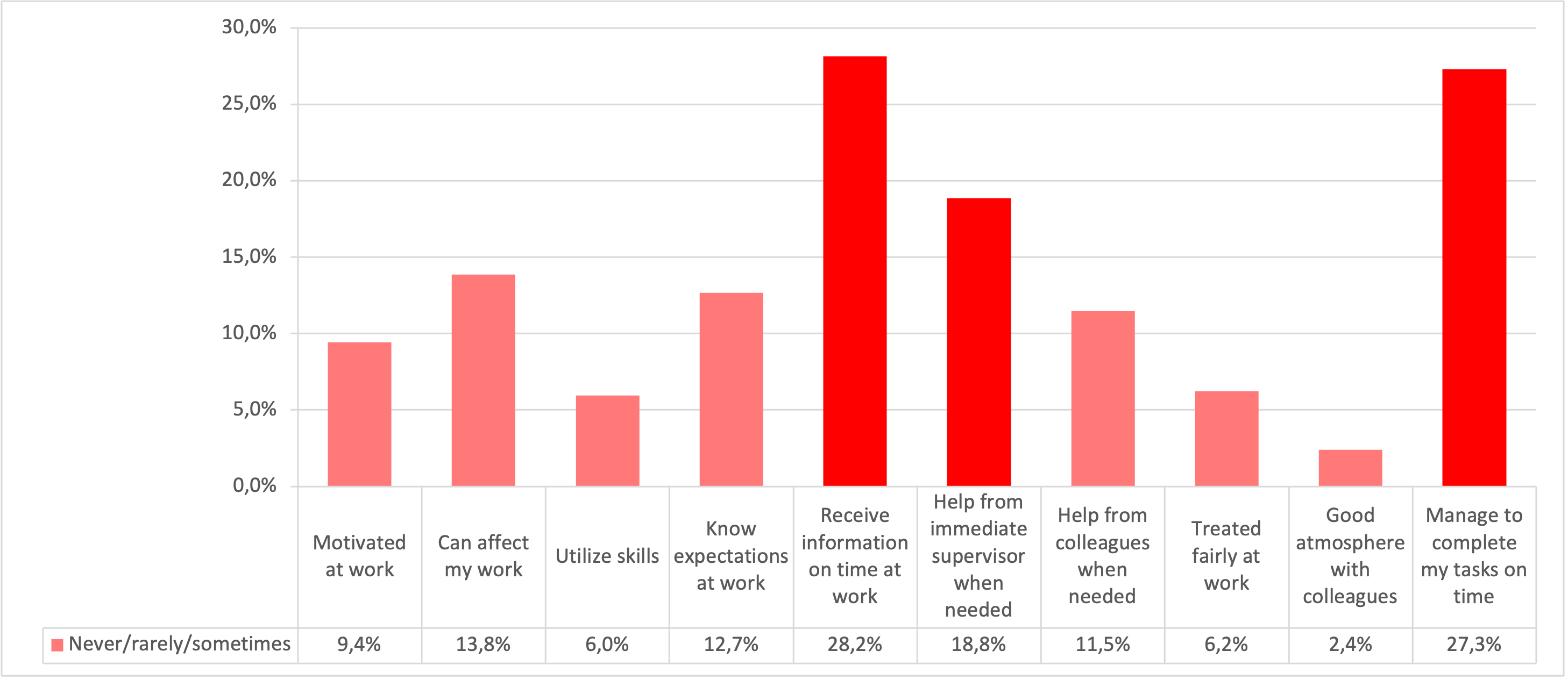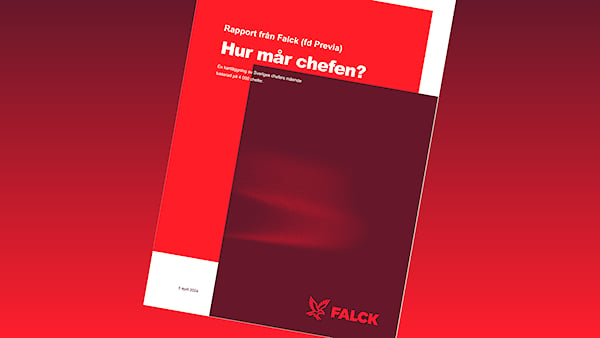Press release
Report: Managers appreciate their job – but stress and drinking habits stand out when asked about their health
240405: Managers in a number of health areas rate their well-being better than employees do. But there are challenges. Managers experience higher levels of stress than employees. More than half of Sweden's managers experience difficulties relaxing and almost three out of ten managers have difficulties keeping up with their tasks. Managers are also more likely than employees to report alcohol habits that can constitute risky drinking for the individual. This is shown in a new survey from Falck (formerly Previa) based on 4,000 managers across the country.
– Being a manager today means high demands and expectations from both management and employees. But managers are also employees with the right to a sustainable work environment, says Lena-Karin Allinger, psychologist and organisational consultant at Falck (formerly Previa).
In the report "How is the boss?", Falck (formerly Previa) has mapped out the health and well-being of managers in particular, but also looked at how the well-being of managers and employees differs. The survey is based on 4,256 health and work environment profiles conducted with managers from January 1, 2023, to December 31, 2023, nationwide. The comparisons with employees are based on 23,934 health and work environment profiles conducted during the same period.
The report shows that managers rate their health slightly better than employees do in most areas. Managers generally feel that they are doing meaningful and stimulating work. In a comparison of eight different areas, managers report better well-being than employees in six of them. This applies to general health status, exercise, musculoskeletal problems, overall social and organizational work environment, sleep, and energy levels. However, in two areas, managers report responses that fall more within the risk level than employees. More managers than employees report stress that may pose a health risk, and more managers than employees report alcohol-related behaviour that may indicate risky drinking for the individual.

In the social and organizational work environment, managers report that many aspects are functioning well. At the same time, there are clear challenges. The areas where managers experience the greatest shortcomings are those that are largely concern matters that "come from above." The three areas within the social and organizational work environment where managers perceive the greatest shortcomings are "receiving timely information regarding important decisions, changes, and future plans", "receiving support from their immediate manager when needed", and " experiencing challenges in keeping up with their workload".

– When managers struggle to keep up, it can have significant effects on the entire organisation. It becomes an inherent systemic issue that causes new problems. That's why it's important to create organisational conditions that enable managers to 'be leaders', says Lena-Karin Allinger.
In total, 36% of managers experience stress at a level that may pose health risks. The corresponding figure for employees is 30%. The fact that managers have a harder time completing their tasks than employees is likely a contributing factor to the higher stress levels experienced by managers. Over half of the managers report having difficulty relaxing. The report also shows that the managerial role comes with higher stress, regardless of educational level.
– Being a manager today involves an enormous amount of pressure and demands from senior management and from employees alike. The perception of constantly being available limits the opportunity for recovery and rest, says Lena-Karin Allinger.
Regarding alcohol, more managers than employees report alcohol consumption that may indicate risky drinking behavior for the individual.The difference between managers and employees seems to show that the managerial role has as great an impact on alcohol habits as educational level does.
The report "How is the boss?" also shows that managers without high stress levels still report responses that may indicate risky drinking behavior for the individual to a greater extent than employees—regardless of stress level.
About the report
The report "How is the boss?" is based on 4,256 health and work environment profiles conducted with managers from January 1, 2023, to December 31, 2023, nationwide. Comparisons with employees are based on 23,934 health and work environment profiles conducted during the same period.
Health and work environment profiles are a mapping tool that addresses lifestyle habits, musculoskeletal problems, well-being, and the social and organizational work environment. Respondents answer a series of questions, providing individuals with insights into how lifestyle habits, physical complaints, fitness, and work environment impact their well-being. The health and work environment profile offer a broad health perspective with a focus on what can improve health for both the individual and the organization.
Being a manager today entails high demands and expectations from both management and employees. Sustainable leadership is crucial for the overall well-being of the organisation. Therefore, it's important to prioritize the well-being of managers.
About Falck
With 1,000 experts at nearly 100 units across the country, Falck is Sweden's most comprehensive provider of health and work life services. We offer occupational health care, crisis and personnel support, transition and career services, as well as primary health care and health services for private individuals. Our health and work life services reach 1.2 million people across Sweden and contribute to a sustainable life for all.
Previa, Sweden's largest occupational health service, has been part of the Falck Group since 2014. In January 2023, Previa ceased to exist as a name and brand, and the former Previa is now completely under the Falck brand.
Read more on falcksverige.se
For more information, please contact
Peter Skald, Head of Communications, +46 (0)70 413 08 13, peter.skald@falcksverige.se
Sandra Ahlstrand, Communications Officer, +46 (0)70 635 89 62, sandra.ahlstrand@falcksverige.se

How is the boss doing?
The report is based on 4,256 health and work environment profiles conducted with managers from January 1, 2023, to December 31, 2023, across the entire country. Comparisons with employees are based on 23,934 health and work environment profiles conducted during the same period.